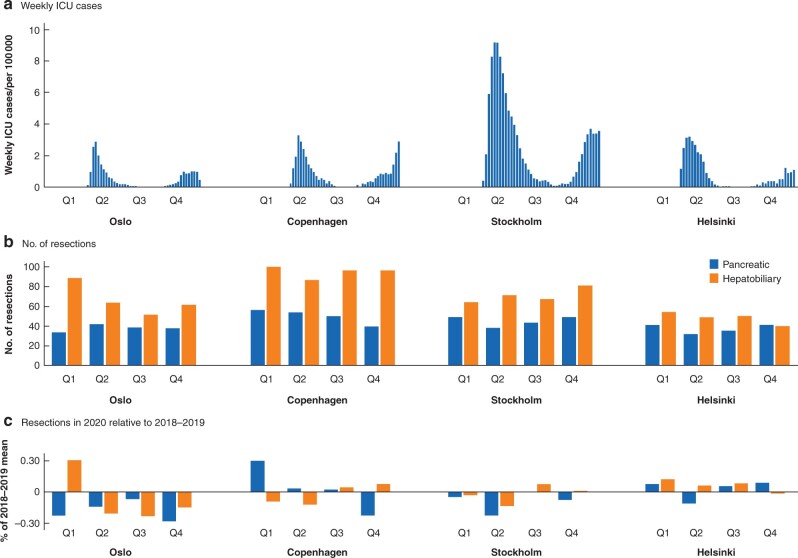Dear Editor
The impact of the ongoing coronavirus disease 2019 (COVID-19) pandemic on the healthcare sector has been immense, including cancellation of elective hepatopancreatobiliary (HPB) surgery for malignancy in some regions1–4. Countries have chosen different strategies to tackle COVID-19, from authoritarian measures to looser, citizen-focused strategies (individual responsibility). The Nordic countries displayed this spectrum—from Finland’s strict to Sweden’s looser approach, and Denmark and Norway somewhere in between. Irrespective of prevailing strategy, a reluctancy to seek medical attention during the pandemic may have delayed surgical resection. There are limited data on the effects of COVID-19 on HPB malignancy, so this retrospective study assessed surgical numbers for 2018–2020 in the Nordic capitals (Copenhagen, Oslo, Stockholm, and Helsinki).
Prepandemic and intrapandemic quarterly resection numbers are presented by region/capital and by time period. The commencement of the Nordic COVID-19 pandemic was arbitrarily set to the beginning of the second quarter of 2020. COVID-19-related ongoing ICU cases on a weekly basis were chosen as a marker of regional COVID-19 load. Statistical analyses were performed using the Mann–Whitney U test, with P < 0.050 considered significant.
The results are presented in Fig. 1, including 5565 HPB resections (2018–2020); there were 480 resections before and 447 resections quarterly per centre during the pandemic (−7.3 per cent; P = 0.347). A decline in resection numbers was present in all regions: Helsinki (−1.2 per cent), Stockholm (−3.4 per cent), Copenhagen (−4.7 per cent), and Oslo (−21.2 per cent; P = 0.016). All participating centres bear testimony to organizational flexibility, as recommended in BJS4, to maintain HPB surgery for malignancy1.
Fig. 1.
Number of hepatopancreatobiliary resections relative to COVID-19 cases in the Nordic capitals,
a COVID-19 ICU load shown for quarters (Q) 1–4 in 2020 for each Nordic capital, b number of pancreatic and hepatobiliary resections in 2020, and c resections in 2020 relative to the mean for resections in 2018 and 2019.
Possible explanations for the fact that Oslo was affected most by the pandemic could be the reluctance of patients to seek medical attention, surgical decision-making, or hospital system plasticity issues.
Disclosure. The authors declare no conflict of interest.
Contributor Information
Marcus Holmberg, Karolinska University Hospital, Department of Upper Gastrointestinal Diseases, and Department of Clinical Science, Intervention and Technology, Karolinska Institute, Stockholm, Sweden.
Hanna Koppatz, Gastroenterological Surgery/Transplantation and Liver Surgery, Helsinki University Hospital and University of Helsinki, Helsinki, Finland.
Anders Jansson, Karolinska University Hospital, Department of Upper Gastrointestinal Diseases, and Department of Clinical Science, Intervention and Technology, Karolinska Institute, Stockholm, Sweden.
Jens Georg Hillingsø, Copenhagen University Hospital, Department of Surgery and Transplantation, Department of Clinical Medicine, and University of Copenhagen, Copenhagen, Denmark.
Peter Noergaard Larsen, Copenhagen University Hospital, Department of Surgery and Transplantation, Department of Clinical Medicine, and University of Copenhagen, Copenhagen, Denmark.
Kristoffer Lassen, Department of Hepatopancreatobiliary Surgery, and Institute of Clinical Medicine, Oslo University Hospital at Rikshospitalet, University of Oslo, Oslo, Norway.
Ville Sallinen, Gastroenterological Surgery/Transplantation and Liver Surgery, Helsinki University Hospital and University of Helsinki, Helsinki, Finland.
Sheraz Yaqub, Department of Hepatopancreatobiliary Surgery, and Institute of Clinical Medicine, Oslo University Hospital at Rikshospitalet, University of Oslo, Oslo, Norway.
Ernesto Sparrelid, Karolinska University Hospital, Department of Upper Gastrointestinal Diseases, and Department of Clinical Science, Intervention and Technology, Karolinska Institute, Stockholm, Sweden.
References
- 1. Soreide K, Hallet J, Matthews JB, Schnitzbauer AA, Line PD, Lai PBS et al. Immediate and long-term impact of the COVID-19 pandemic on delivery of surgical services. Br J Surg 2020;107:1250–1261. [DOI] [PMC free article] [PubMed] [Google Scholar]
- 2. Richardson S, Hirsch JS, Narasimhan M, Crawford JM, McGinn T, Davidson KW et al. ; Northwell COVID-19 Research Consortium. Presenting characteristics, comorbidities, and outcomes among 5700 patients hospitalized with COVID-19 in the New York City area. JAMA 2020;323:2052–2059. [DOI] [PMC free article] [PubMed] [Google Scholar]
- 3.COVIDSurg Collaborative. Elective surgery cancellations due to the COVID-19 pandemic: global predictive modelling to inform surgical recovery plans. Br J Surg 2020;107:1440–1449. [DOI] [PMC free article] [PubMed] [Google Scholar]
- 4.BJS Commission Team. BJS commission on surgery and perioperative care post-COVID-19. Br J Surg 2021;108:1162–1180. [DOI] [PubMed] [Google Scholar]



